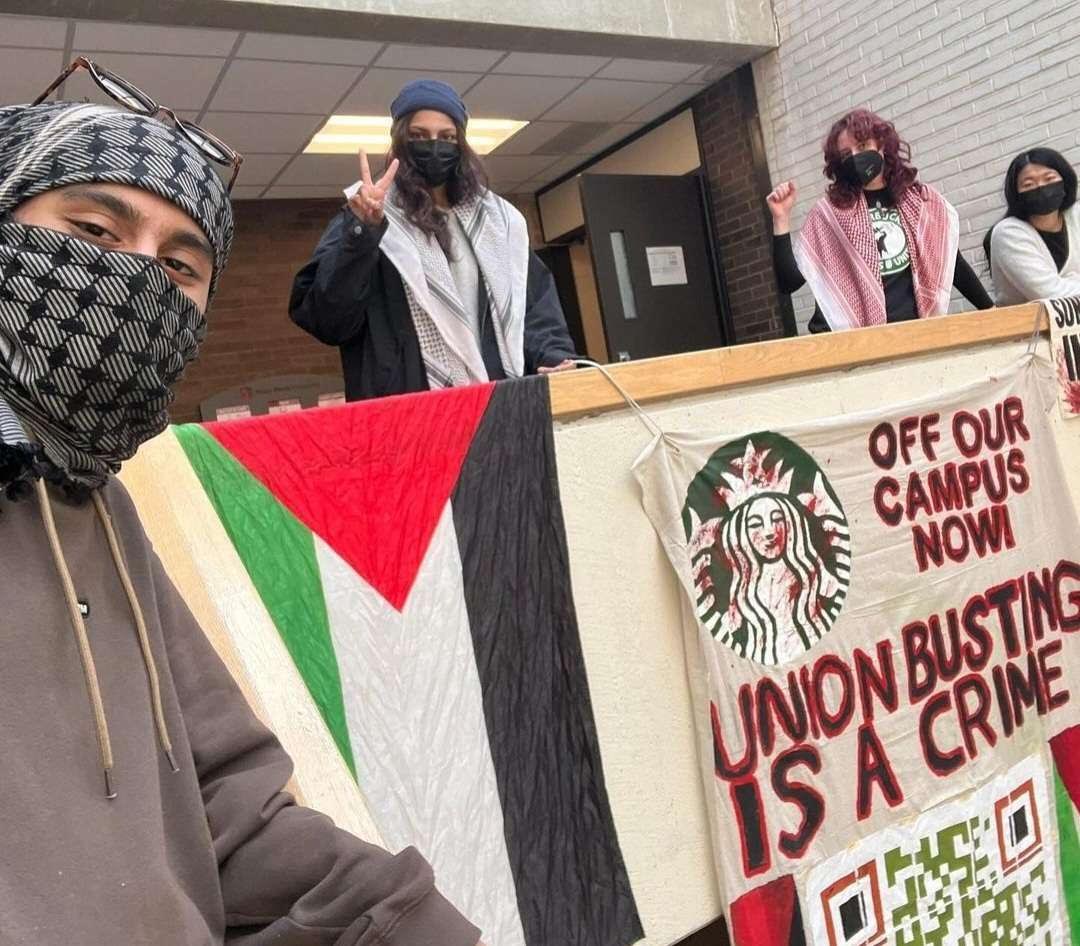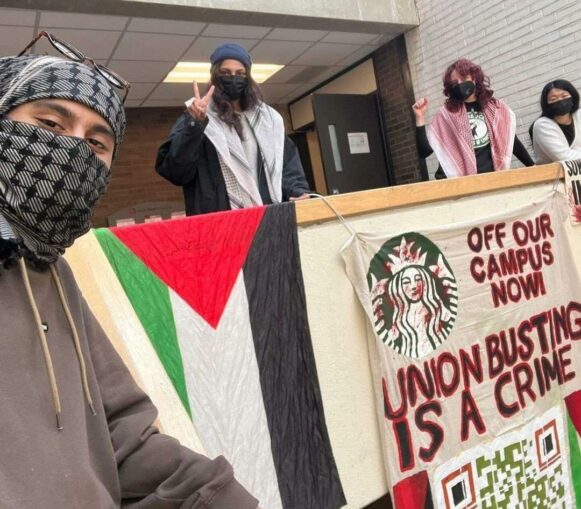

National day of action Feb. 22, across 25+ college campuses supports Starbucks Workers United. Workers and community members made the connection between the struggle of the Starbucks baristas and Palestinian liberation. (Photo: Starbucks Workers United)
Starbucks Workers United, which represents workers in 380 Starbucks stores, announced a major victory on Feb. 27. The gains include a series of benefits that the company formerly withheld from unionized stores, namely the implementation of credit card tipping and wage increases. To allow benefits in non-union stores while withholding them from union locations is an illegal Unfair Labor Practice.


National day of action Feb. 22, across 25+ college campuses supports Starbucks Workers United. Workers and community members made the connection between the struggle of the Starbucks baristas and Palestinian liberation. (Photo: Starbucks Workers United)
The union also announced the company’s agreement to a framework for bargaining a contract. Up until now, the company had refused to negotiate, opting instead to stonewall talks and increase pressure against the union.
Credit card tipping was a very popular demand among workers who were fighting for the union. The pressure the union was able to exert against the company caused Starbucks to implement credit card tipping for non-union stores in the first place. It is an example of the tangible benefits gained, even before bargaining, because the workers exercised their collective power.
Whether Starbucks begins bargaining in good faith, or if this is just another delay tactic, remains to be seen. But these victories over raises and credit card tipping are substantial by themselves, and the company knows the workers are willing to keep fighting to ensure contract negotiations commence as promised.
First organized in 2021
Starbucks Workers United (SBWU) organized its first stores in Buffalo, New York, in 2021 and has continued growing since. The union has won elections at nearly 400 stores across the country, with many more still fighting for recognition. SBWU has been able to lead successful large-scale strikes encompassing hundreds of stores, including on Red Cup Day, which is one of the biggest days each year for in-store sales, and the Pride strike, when workers shut stores down in support of trans workers who faced retaliation for their union organizing.
It wasn’t a change of heart among management that brought these gains, nor the National Labor Relations Board rulings on thousands of Unfair Labor Practice charges workers brought. The credit lies in the determined effort of the workers to organize and to muster support from sympathetic customers. This is only the beginning of what workers can achieve by banding together in their common working-class interests.
Impact of genocidal war
These developments take place amid a massive worldwide boycott of Starbucks, protesting the company’s role supporting genocide against Palestine. Starbucks lost billions of dollars from reduced sales, partly due to the Boycott, Divestment, Sanctions (BDS) movement, which names Starbucks on its list of companies complicit in Zionist apartheid.
Some countries, like Morocco, have experienced mass closures of Starbucks stores. While Starbucks denies that the boycott propelled the closures, it has undoubtedly reduced the company’s profits, especially in Africa and the Middle East.
Management is now fighting a class war on two fronts. On the home front, it attempts to crush the union movement and curtail the expansion of the workers’ organizing. On the international front, it tries to ride out the storm brought on by the boycott.
‘Organizing works!’
Starbucks corporate managers are making their own calculations about where they can relieve pressure. It is possible that the decision to work out an agreement with the union is partially motivated by a desire to close the war on the domestic front and focus its resources elsewhere.
One thing is absolutely clear: Both the militant grassroots organizing of U.S. Starbucks workers and the mass boycott initiated by the global Palestinian solidarity movement have impacted Starbucks. Organizing works!
Working-class and oppressed people hold the true power, and when they come together to realize this in collective action, they can win benefits that would otherwise be impossible.
Starbucks Workers United came out strongly in support of Palestine immediately after October 7 and has subsequently issued some of the most principled statements in solidarity with Palestine of all U.S. labor unions. The union movement and the Palestine solidarity movement are two manifestations of the global class struggle, and both movements have everything to gain from their united actions.
The author is a former Starbucks worker and helped organize the first unionized Starbucks in Buffalo, New York, and has also been active in the Buffalo movement to support the liberation of Palestine.
Download the PDF Black and white version All out for May Day! Students defend pro-Palestine…
By Jonas, Mutual Aid Scientific Socialism To the workers and free peoples of the world: We…
Houston Mumia’s supporters gathered in Houston’s historic Emancipation Park on April 27, not just to…
El Partido Mundo Obrero (PMO/WWP) saluda el 50 aniversario de la impresionante victoria de la…
Spain’s Prime Minister Pedro Sanchez cancelled a multimillion-dollar arms deal recently to buy munitions from…
Buenos Aires, April 15, 2025 Katz is an economist, researcher at the National Scientific and…